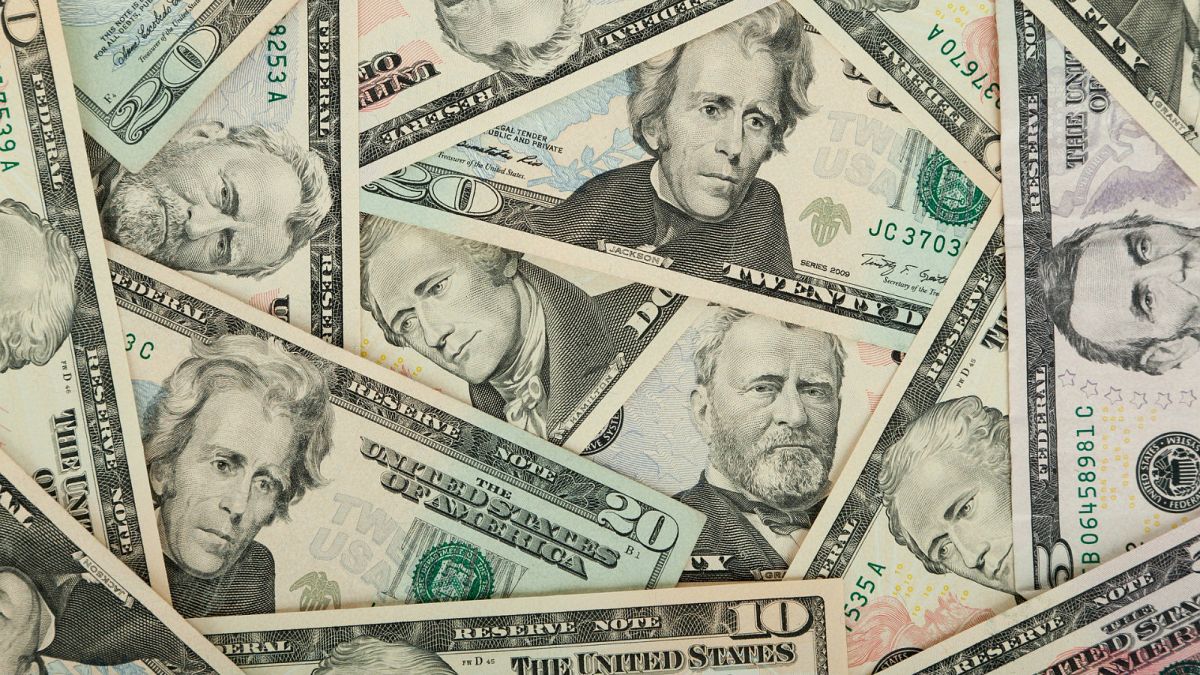The government is preparing a bill to ‘de-dollarize’ the Russian economy in response to incoming US sanctions. Drawn-up using ideas from VTB bank head Andrei Kostin, the bill could be approved by Prime Minister Dmitry Medvedev in just two weeks.
The government is preparing a bill to ‘de-dollarise’ the Russian economy in response to incoming US sanctions.
Drawn up using ideas from VTB bank head Andrei Kostin, the bill could be approved by Prime Minister Dmitry Medvedev in just two weeks.
Kostin himself said President Vladimir Putin "as a whole" endorsed his proposals, which seek to reduce Russian dependence on the US, although details of the draft law are yet to be made clear.
Regardless, government representatives say its goal isn’t to restrict payments in dollars but to encourage foreign trade to be settled in roubles or other currencies.
To discuss the bill, Euronews turned to Alexander Abramov, economic sciences professor at the Higher School of Economics (HSE) University in Russia, and Vasily Solodkov, the director of the HSE Banking Institute.
What is Kostin's plan?
Professor Abramov: “These are initiatives aimed at switching payments in dollars to payments in other currencies. I understand that this is some kind of proactive measure in response to possible further US sanctions, after which it may be difficult for banks to access dollars, so Kostin wants to untie his hands so that foreign currency deposits can be made in another currency.
"In some ways, this corresponds with government policy, but generally speaking it is a corporate plan."
Solodkov: “Kostin’s plan, by and large, aims to undermine the monopoly of the US dollar. But if it does happen, a very significant blow will be dealt to the Russian energy market.”
Is Kostin’s plan likely to be adopted?
Professor Abramov: “If you take the basis of Kostin’s plan, there is a lot of rationality in it. Any strong country should consider promoting its currency for various international settlements. At least part of Kostin’s plan could be implemented.
"But it is important that decisions concerning costs and the currency used for complex foreign contracts are not made off the cuff. This is a job that takes years and decades. I recall how the yuan promoted itself as an international currency, how difficult it was. It was painstaking, meticulous work that was largely hidden from public view.
"Kostin's plan, rather, is preparation for the worst-case scenario if, in November, new US sanctions follow.”
Could Kostin's plan weaken the dollar?
Solodkov: “The dollar could be destabilised if at the same time China, Japan and the EU together decide not to use it for transactions or their reserves. But the probability of this leans towards zero.
"The main issue is that reserve currencies are not chosen at will. There is objective demand, both for payments and savings in these currencies. Unfortunately, none of the currencies with which the Russian Federation intends to pay, with the exception of the euro, is a currency that everyone would like to have.”
Professor Abramov: "If Russia succeeds in convincing European Union countries, as our main consumers, to make oil payments in euros rather than dollars, this would be a real, tangible blow to the dollar.
But imagine stepping into the shoes of a European partner: to what extent would this be a long-term solution? Why would they want to force a confrontation between Europe and the United States?”
How could Kostin's plan affect the Russian economy?
Professor Abramov: "If we look at international statistics concerning what currencies are used for foreign transactions, is is consistent. Why? Because their value must be stable, as abrupt fluctuations are dangerous.
"Maybe, in this regard, it would make sense to implement Konstin's plan to weaken impact of any sanctions, but for the economy it would not make sense at all."
Solodkov: “Switching to another settlement currency would do nothing but increase the risk and increase the cost of settlements. The Russian Federation will be the one to suffer.
"Renouncing the dollar will lead to lower economic growth, which will lead to a further drop in the standard of living in Russia where real wages have also been falling."
